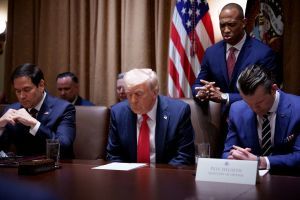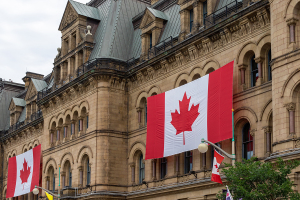Hysterical Reaction Against Indiana's Religious Freedom Bill Prompts Outcry From NCAA, Gay Bishop

Protesters are demonstrating, the Obama administration is speaking out, the mainstream media is in an uproar, major companies are threatening boycotts, and even the NCAA is concerned that a new bill signed into law by Indiana governor Mike Pence could negatively impact the "inclusive" culture of college sports.
Why such an extreme reaction to a bill simply reinforcing the religious freedoms of all Americans?
Could it be that conservative Americans have dared to fight back against gay activists and their allies?
Writing in the National Review, Patrick Brennan noted that, "When Indiana governor Mike Pence signed a religious-liberty-protection statute into law this past week, he probably didn't expect the activist backlash and accusations that he'd just endorsed or legalized discrimination. In part, that would be due to the fact that dozens of states and the federal government have had similar laws for years and there's been no epidemic of discrimination against gays and lesbians."
To be sure, as Brennan noted, the current bill and the federal bill (and other, individual state bills) are not identical, but they are close enough to raise the question of, "Why the outcry now?"
As Josh Blackman pointed out, also in the National Review, "the Indiana law is modeled on the 1993 federal law of the same name, and that counterparts have been adopted in 19 other states.
Further, four federal courts of appeals and the Obama Justice Department have all taken the position that RFRA [the Religious Freedom Restoration Act] can be used as a defense in private suits involving the enforcement of laws that substantially burden free exercise of religion."
Exactly.
So, to ask once more, why all the histrionics?
When Gov. Pence signed the bill into law, he said, "Today I signed the Religious Freedom Restoration Act, because I support the freedom of religion for every Hoosier of every faith. The Constitution of the United States and the Indiana Constitution both provide strong recognition of the freedom of religion but today, many people of faith feel their religious liberty is under attack by government action."
And it is for good reason that many people of faith feel this way, as has been documented almost endlessly in recent years. Shouldn't every freedom-loving American celebrate this bill?
Not if you ask Apple CEO Tim Cook, himself gay, who stated in an op-ed for The Washington Times, "There's something very dangerous happening in states across the country.
"A wave of legislation, introduced in more than two dozen states, would allow people to discriminate against their neighbors."
According to Episcopal Bishop Gene Robinson, also proudly gay, "This is old-fashioned discrimination all dressed up in ecclesiastical vestments and 'religious freedom' language." Having lost our battle against same-sex "marriage," Robinson claims, we are now fighting to legalize our anti-gay animus.
Even Mark Emmert, president of the NCAA, which oversees all college athletics, expressed his concerns over the bill, to the point that there was even talk of relocating one of the most prestigious sports events in America – the NCAA's basketball Final Four – from Indiana to another location, on just a few days' notice.
Yes, even playing basketball in Indiana could negatively affect collegiate athletes. (Ultimately, Emmert said that the games would not be relocated for now.)
Certainly, there are some sincere people who believe that, with the passing of this bill, a gay victim of a car accident could be refused ambulatory or medical care because of someone's purported religious beliefs, a scenario that Gov. Pence and every conservative I know would denounce as utterly reprehensible and contrary to the law.
That's why Daniel O. Conkle a professor and legal scholar who is a pro-gay rights and same-sex "marriage" advocate, explained, "despite all the rhetoric — the bill has little to do with same-sex marriage and everything to do with religious freedom."
Prof. Conkle actually supported the bill and felt it was both good and needed.
Why then the shrill outcry? Why then the threats to boycott? Why then the histrionics?
This is reminiscent of what happens when a child who is used to getting his way is firmly told, "No," or when a bully is successfully backed down. The reaction, to put it mildly, is overblown.
Could this explain why the response to the bill has been so intense, at times even hysterical?
(Although I'll surely be misquoted here, while I have compared gay activists to bullies in the past, I am not comparing them here to children. I'm drawing a parallel to the nature of the reactions.)
Hugh Hewitt rightly noted that, "The religious community, of course is the last institution standing against what the LGBT community wants. The church has been specifically targeted. Rather than live with accommodation, the LGBT community now seeks to use the force of government to control religious opposition to their desires."
And so any legislature that stands up for our essential freedoms can expect a similar firestorm.
Now is the time to make it clear that we're not about to back down or cave in to the pressure and bad press, declaring once again that the bullying will back fire.
As I've said many times before, the unspoken mantra of gay activism is, "We will intimidate and we will manipulate until you capitulate."
The response of millions of freedom-loving Americans remains the same: We're not going to capitulate.
We will love our LGBT friends and neighbors and co-workers and family members, but we will not surrender our freedoms.
Can I hear an "Amen"?
(Now would be a good time to Like and Share this link to Gov. Pence Facebook page. A little encouragement goes a long way.)





























